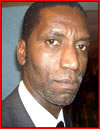Monday, December 15, 2008
By Rejoice Ngwenya, Harare, Zimbabwe
 A myriad of biblical interpretation is given to the deliverance of Children of Israel from Ancient Egypt with profound sentimental passion. The biblical emotion is not derived so much from the misery of captivity as it is about the power of divine intervention in times of human need.
A myriad of biblical interpretation is given to the deliverance of Children of Israel from Ancient Egypt with profound sentimental passion. The biblical emotion is not derived so much from the misery of captivity as it is about the power of divine intervention in times of human need.
Moreover, the story assumes cult status when one is confronted with the harsh reality that even with overt, incessant Mosaic exigency, it is only the Twelfth Plague that transforms King Pharaoh from lethargic obstinacy to rapid compliance. A similar scenario could well be at play in Zimbabwe, though this time, the intervention sought is physical, not spiritual.
British Prime Minister Gordon Brown recently added his voice to the symphony of coordinated international action to help Zimbabwe overcome a cholera outbreak, latest in the litany of tyranny through ‘forceful intervention’.
A predictable Mr. Mugabe concluded that Brown’s statement was part of a western plot to intervene militarily in his country in order to dismiss him from power. And history is on his side- A few years ago, Robert Mugabe considered similar statements by British cleric and
Ugandan born Dr John Sentamu’s as a symbolic shredding of his dog collar, hence consigning them to the repertoire of non-effectual miracles in the mode of Mosaic walking canes that turn into harmless snakes, the blooding of the Nile water, frog, gnats, and fly invasions.
Like the ancient Pharaoh, death of animals, festering boils, destructive hailstorms, locusts and three-day eclipses can only incense Mugabe to more defiant and arrogant brutality on his hapless subjects.
It is therefore hard to believe how protagonists of “prosecution of crimes against humanity” can hope to shift Mugabe’s obstinacy without dispensing the Thirteenth Plague.
Students of African Liberation History will know that when it comes to
United Nations resolutions on direct interventions, such international
diplomacy tops the list of political placebo. Before there is evidence of decisive action in the Darfur, Somalia, Democratic Republic of Congo and Swaziland, Dr John Sentamu will need to cut many more dog collars.
Moreover, questions are already raging whether or not the ‘West’ –particularly London – is the right epicentre of global condemnation. Sceptics are right.
We Africans with a vague but critical interest in the liberation of
modern-day Zimbabwe have lived long enough to take large dosages of British hypocrisy. I am particularly aloof to these double standards because I am an integral part of the Ndebele tribe that watched with horror while Gordon Brown’s predecessors knighted Robert Mugabe in the 1990s despite his participation in near-extermination of my tribesman.
When outgoing Republican government Secretary of State Condoleezza Rice says Mugabe ‘has blood on his hands’, I hope that it is more a reference to the 1980s Gukurahundi massacre than it is of the most recent violent land expropriation, or Morgan Tsvangirayi’s so-called persecution.
I will further add that the emergence of Morgan Tsvangirayi as a major opposition force and his resultant persecution at the hands of Mugabe has less credibility at The Hague than when Joshua Nkomo’s people in Matabeleland faced near extinction. Moreover, one can correctly argue that by either omission or commission, Morgan Tsvangirayi’s ‘deafening silence’ during Gukurahundi is more than blight to his present-day heroic status.
It is further proof that political hypocrisy is as much part of human history as is genocide, tyranny and dictatorship. We are therefore yet to see whether or not the cholera epidemic and hyperinflation are the last plagues that will drive Robert Mugabe into late retirement.
